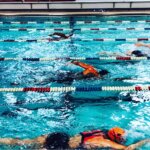When you’re getting into some high training volume or high intensities, or even post-race, what is your recuperation technique? Do you have one? Maximizing your recovery schedule is often neglected by triathletes, but it’s actually one of the most important tasks. Nutrition – and re-fueling your body – is just as important and a post-race stretch.
Of course the work starts before the race. Eating a balanced and nutritious diet before a race will also help you to recover more quickly. Knowing what foods to eat to fuel your training is important, but to reap the benefits of the nutrients, it’s the when that really matters.
Recovery nutrition has a huge impact on your performance. It allows your body to become stronger, resilient and adapt – and the right fuel – taken at the right time – will make all the difference in the world to maximize your athletic performance and recovery.
Fueling Before Workouts
Fueling your body before a training session is critical. It will help you figure out what your body can tolerate, prepare your digestive system and help you become more aware of what food is best to get through the intensity and length of a race.
Be sure not to skip fueling your body – even before short training sessions. These short trainings add up and helps train your body to handle the sugars and fluids during the long, stressful day of the race.
Don’t Skip the Carbs
Many athletes think you should stay away from the carbohydrates during training. But if you’re training at higher intensities, you need the carbs. Carbohydrates are used to provide energy, prevent illness and supply several vitamins and minerals. Higher carb intake during heavy training can also prevent mood swings and overtraining syndrome. You will get the most out of your training if you eat carbs before and during your workouts. Afterwards, pair those carbs with some protein as well.
Don’t Overdo it on the Supplements
Many athletes reach for the post-workout recovery shake, which ideally has a 4:1 carbs to protein ratio. In addition, it is crucial to have a balanced, whole food-based diet to ensure proper recovery. Too many supplements (bars gels, drink mixes, etc.) can hinder the room for real food. Supplements should do exactly that – supplement your real diet. Make sure between training and rest periods you prioritize your diet with quality protein, beans, produce and whole grains. This balanced diet will supply the fiber, calories and micronutrients your body really needs.
By following these tips you can improve your health, overall performance and may find yourself gaining a new competitive edge. If you feel like you’re not sure if your properly recovering from your training and/or racing, contact us today to see how we can help.
Train Right, Tri Right,
Coach MJ







